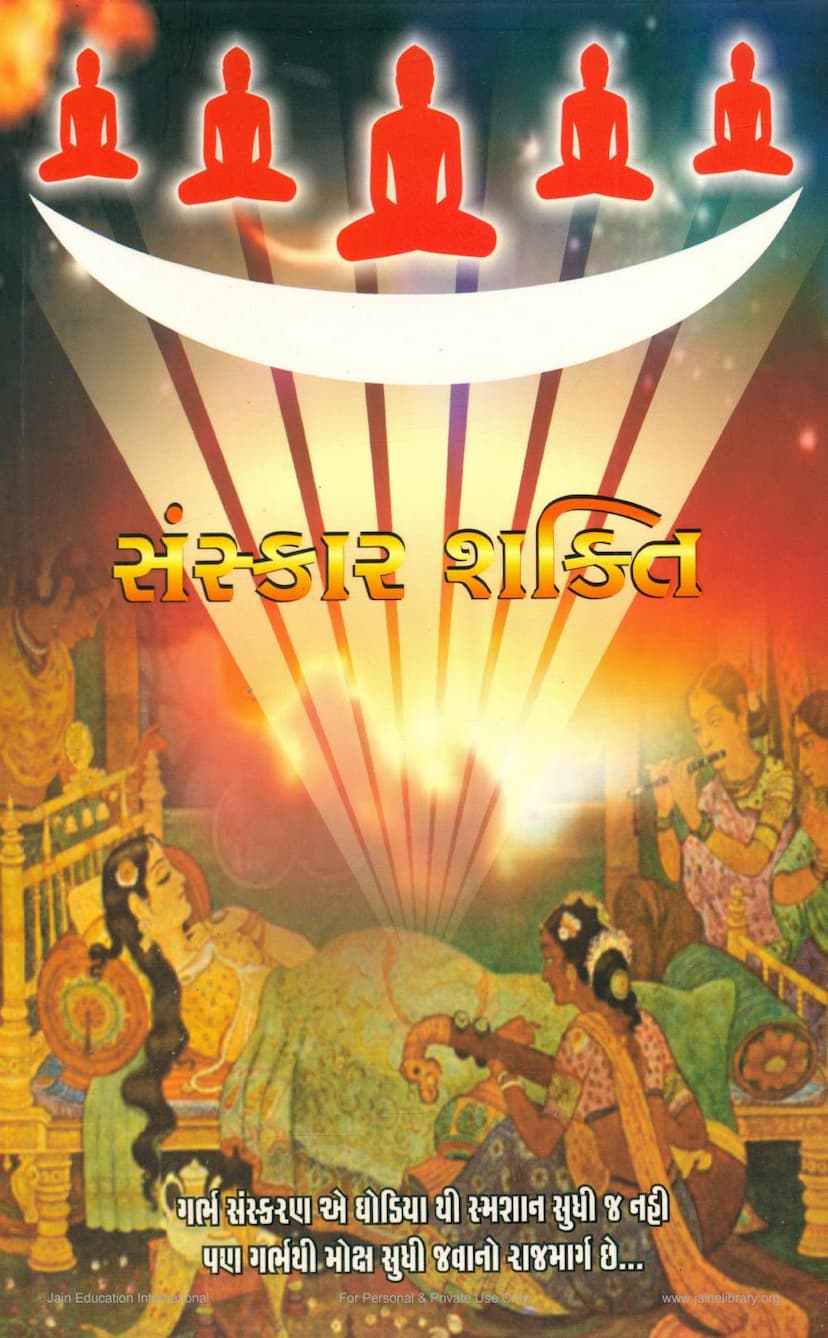Sanskar Shakti
Added to library: September 2, 2025

Summary
This document is the Gujarati text of the book "Sanskar Shakti" (संस्कार शक्ति), published by Sanskar Shakti Garbh Sanskaran Kendra. It is a comprehensive guide on Garbha Sanskar (ગર્ભ સંસ્કાર), the practice of imbuing a child with virtues and sanskars (values) even before birth. The book emphasizes the profound influence of the mother's thoughts, actions, and environment on the developing fetus, drawing upon Jain philosophy, Ayurveda, and modern scientific insights.
Here's a summary of the key themes and content:
Core Philosophy and Purpose:
- From Conception to Liberation: The book posits that Garbha Sanskar is not merely about physical or mental development but a spiritual process that guides the child from conception to liberation (moksha).
- Holistic Development: It aims to create not just intelligent but also virtuous, characterful, and spiritually inclined individuals.
- Parental Responsibility: It stresses the crucial role of parents, particularly the mother, in shaping the child's future through conscious efforts during pregnancy.
- Reviving Ancient Wisdom: The book seeks to revive and reintroduce the ancient Indian traditions, specifically within the Jain context, of preparing for and nurturing a child during pregnancy.
Key Concepts and Practices:
- The Significance of Pregnancy: Pregnancy is presented as a sacred period for nurturing a child with good sanskars. The mother's every action, thought, and emotion directly impacts the fetus. Maintaining a disciplined, pure, and positive lifestyle is paramount.
- The Power of Intention (Sankalp): The book strongly emphasizes the role of the parents' clear intention and visualization of the desired child. This involves defining the child's qualities, intellect, character, and even physical appearance through focused thought.
- Purity (Shuddhi): This encompasses physical purity (diet, hygiene), mental purity (positive thoughts, devotion), purity of desires, and purity of intentions. Pre-conceptual care and purification rituals are highlighted.
- The Sixteen Sanskars (Shodasha Sanskar): While focusing on prenatal sanskars, the book lists and briefly explains the traditional sixteen sanskars in the Jain tradition, from Garbhadhan (conception) to Antyeshti (last rites), underscoring the continuous process of spiritual development throughout life.
- Ayurvedic Principles: The book integrates Ayurvedic concepts, such as the importance of timing for conception, dietary recommendations (sattvic diet), the four factors for conception (Ritu - season/menstrual cycle, Kshetra - uterus, Ambu - nourishment/blood, Beej - sperm/ovum), and the benefits of specific herbs and practices.
- Mind-Body Connection: The impact of the mother's mental state – her emotions, thoughts, and even dreams – on the fetus is extensively discussed. Historical and mythological examples illustrate how parental thoughts and desires manifest in children.
- Diet and Lifestyle: Detailed guidance is provided on what pregnant women should eat and avoid, emphasizing a sattvic, nourishing diet and a peaceful lifestyle. This includes advice on hygiene, clothing, and avoiding strenuous activities or negative environments.
- The Father's Role: The book also outlines the father's supportive role during pregnancy, emphasizing emotional support, shared reading, and creating a positive atmosphere.
- The Importance of Brahmacharya: The practice of celibacy or controlled sexual energy (Brahmacharya) before and during pregnancy is highlighted as crucial for creating strong and pure "seeds" for the child.
- Music Therapy (Sangeet Chikitsa): The therapeutic power of music and specific ragas is discussed, suggesting how calming and divine music can positively influence the fetus's development and the mother's well-being.
- The Developing Fetus: The book provides a month-by-month overview of fetal development, explaining the physical and sensory milestones.
- Dreams and Cravings (Swapna and Dohda): The significance of dreams and cravings during pregnancy is explored, linking them to the child's future qualities and the need to fulfill appropriate desires.
- The "Maternal Bhavan" Concept: A vision for a "Mangal Matru Bhavan" (Auspicious Motherhood Center) is presented, envisioning a holistic environment for pregnant women and couples, offering counseling, spiritual guidance, and community support.
- Personal Testimonials: The book includes personal accounts from mothers who have experienced the benefits of Garbha Sanskar, sharing their journeys and the positive transformations in their lives and their children.
- Jain Philosophy Integration: Throughout the text, there are references to Jain scriptures, teachings of Tirthankaras, and practices like the Navkar Mantra, highlighting how these spiritual elements enhance the Garbha Sanskar process.
- Parenting Philosophy: The book also touches upon effective parenting techniques, drawing from Chanakya's wisdom, emphasizing discipline, imparting values, and fostering a child's holistic development beyond mere academic achievement.
In essence, "Sanskar Shakti" is a spiritual and practical manual for expectant parents, particularly within the Jain tradition, aiming to empower them to consciously create virtuous, healthy, and spiritually inclined children by embracing the profound science of Garbha Sanskar.